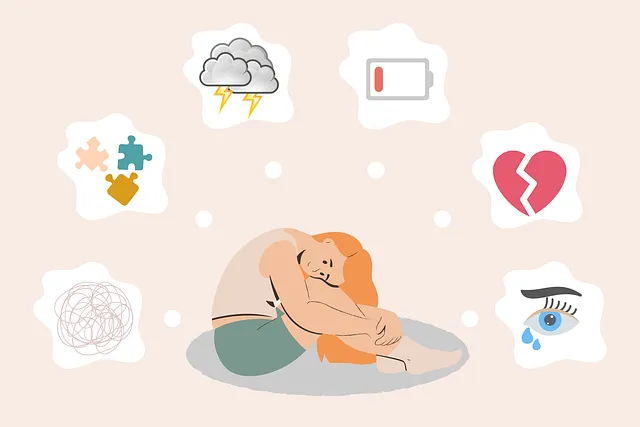Burnout among healthcare providers is a significant concern driven by factors like high workload, long shifts, and exposure to trauma. Superior Kaiser Permanente mental health coverage offers comprehensive programs such as Crisis Intervention Guidance and Depression Prevention to combat this issue. Their multi-faceted approach includes regular check-ins, group therapies, and peer mentorship, promoting mental health awareness and resilience. By prioritizing proactive burnout prevention strategies, organizations like Kaiser Permanente enhance staff well-being, reduce turnover, and improve patient care quality. Access to comprehensive mental health services enables healthcare professionals to prioritize self-care, manage stress effectively, and ultimately mitigate burnout risks.
Healthcare provider burnout is a growing concern, impacting patient care and organizational success. This article explores comprehensive strategies to prevent burnout among healthcare professionals, focusing on the role of superior Kaiser Permanente mental health coverage as a game-changer. We delve into understanding burnout’s root causes and its profound effects on providers and patients alike. Additionally, we examine practical approaches for clinical settings and emphasize the importance of self-care for long-term resilience.
- Understanding Burnout Among Healthcare Providers: Causes and Impact
- Kaiser Permanente's Mental Health Coverage: A Comprehensive Look
- Implementing Effective Burnout Prevention Strategies in Clinical Settings
- Promoting Self-Care and Resiliency for Long-Term Well-being
Understanding Burnout Among Healthcare Providers: Causes and Impact

Burnout among healthcare providers is a growing concern, with significant implications for both individual well-being and patient care. It’s more than just feeling temporarily stressed; it’s a state of emotional exhaustion, cynicism, and reduced professional efficacy. This crisis is driven by various factors such as high workload, long shifts, administrative tasks, lack of control over work schedules, and exposure to traumatic situations. These stressors can lead to severe consequences, including physical and mental health issues, decreased job satisfaction, and potentially hazardous decision-making.
At Kaiser Permanente, superior mental health coverage plays a crucial role in addressing this crisis. Their comprehensive Crisis Intervention Guidance and Depression Prevention programs offer resources for healthcare providers to recognize and manage their well-being. By fostering Mental Health Awareness, these initiatives not only support individual resilience but also contribute to creating a healthier work environment. This proactive approach ensures that healthcare professionals can continue to deliver high-quality care without burning out.
Kaiser Permanente's Mental Health Coverage: A Comprehensive Look

Kaiser Permanente is renowned for its comprehensive mental health coverage, offering a robust suite of services designed to support the holistic well-being of its members. This superior Kaiser Permanente mental health coverage encompasses a wide range of programs aimed at addressing various aspects of emotional regulation and stress management. The organization prioritizes prevention through regular check-ins, screening, and education sessions, empowering individuals with tools for early intervention and self-care.
Beyond individual therapy, Kaiser Permanente fosters community outreach program implementation to create supportive networks. Their approach recognizes the interconnectedness of mental health and incorporates group therapies, support groups, and peer mentorship programs. By integrating these initiatives, Kaiser Permanente facilitates a nurturing environment where members can connect, share experiences, and gain invaluable insights into stress management strategies. This multifaceted strategy not only tackles burnout but also promotes long-term emotional resilience among its diverse population.
Implementing Effective Burnout Prevention Strategies in Clinical Settings

Implementing effective burnout prevention strategies is paramount for clinical settings to ensure the well-being and longevity of healthcare providers. Organizations like Superior Kaiser Permanente recognize the importance of comprehensive mental health coverage, including superior Kaiser Permanente mental health coverage options, as a key component in mitigating burnout risk. This involves not just providing access to therapy and counseling services but also integrating stress management techniques into daily workflows. Regular staff meetings dedicated to discussing stress levels, workload distribution, and emotional well-being can foster a supportive environment where providers feel heard and valued.
Additionally, organizations should conduct regular risk assessments for mental health professionals to identify early signs of burnout or depression prevention triggers. This proactive approach allows for timely interventions, whether through individualized support plans, flexible scheduling, or access to employee assistance programs. By prioritizing burnout prevention, healthcare institutions not only reduce staff turnover but also enhance patient care quality and satisfaction.
Promoting Self-Care and Resiliency for Long-Term Well-being

Promoting self-care and building resilience are essential strategies to prevent healthcare provider burnout and ensure long-term well-being. Kaiser Permanente’s superior mental health coverage plays a pivotal role in supporting healthcare professionals by providing access to comprehensive services, including counseling and therapy. This enables providers to prioritize their emotional well-being and develop effective coping mechanisms for stress management.
Encouraging self-care routines can significantly contribute to reducing the impact of work-related pressures. Simple practices like mindfulness meditation, regular exercise, and maintaining a balanced diet can go a long way in promoting mental health. Additionally, Kaiser Permanente’s focus on Mental Illness Stigma Reduction Efforts fosters an environment where healthcare providers feel comfortable seeking support without fear of judgment. Through these initiatives, professionals are empowered to integrate Self-Care Routine Development for Better Mental Health into their daily lives, ultimately enhancing their ability to care for others and mitigating the risks associated with burnout.
Healthcare provider burnout is a significant concern, but with the right strategies, it can be mitigated. By understanding the causes and impact of burnout, implementing comprehensive mental health coverage like that offered by Superior Kaiser Permanente, and promoting self-care and resilience, clinical settings can foster a healthier work environment. These proactive measures are essential for ensuring healthcare providers’ long-term well-being and maintaining high-quality patient care.






